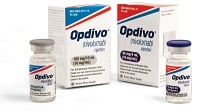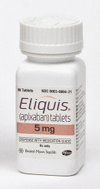
Bristol-Myers Squibb ($BMY) may be bracing for a sales hit as its blockbuster antipsychotic Abilify goes off patent next month. But the drugmaker can celebrate first-quarter results in the meantime, thanks to promising numbers for some newer meds.
The company brought in $4 billion in sales, a 6% jump from the same quarter last year and about $200 million above Wall Street expectations. Sales would have grown twice that amount--or 13%--if not for the effects of the stronger dollar. Standout performances for new-age clot-fighter Eliquis and newly launched cancer immunotherapy Opdivo helped boost the company's numbers. Eliquis sales more than tripled, to $355 million in Q1 compared with $106 million during the same quarter last year. Opdivo racked up $40 million in sales since gaining FDA approval in late December.
BMS also got help from higher-than-expected royalties on its schizophrenia treatment, Abilify. Sales for the drug, including that royalty adjustment, increased 3% to $554 million, a last flicker of success as it approaches its patent expiration in May. Abilify already faces competition from a longer-acting injected version, Abilify Maintena, sold by Danish drugmaker Lundbeck and Otsuka, Bristol's partner on the original oral formula. Now, BMS is bracing itself for low-price generic rivals, expected to gobble up sales in 2015.
The company is counting on Opdivo and Eliquis to fill Abilify's big shoes. Already approved in melanoma, Opdivo has charged into lung cancer with a lickety-split FDA nod, beating Merck's ($MRK) rival treatment Keytruda to the market. And Opdivo is preparing for a European launch in melanoma, armed with a recent thumbs-up from the European Medicines Agency's (EMA) Committee for Medicinal Products for Human Use. If all goes according to plan, analysts see Opdivo charting peak sales of around $5 billion--and some predict as much as $7.3 billion by 2020.

Eliquis is battling its own rivals in the cardiovascular arena as BMS and partner Pfizer ($PFE) chase $3 billion in peak sales for the drug. The treatment competes in a three-horse race with Johnson & Johnson ($JNJ) and Bayer's Xarelto, and Boehringer Ingelheim's Pradaxa, but entered the market last and got off to the slowest start. BMS and Pfizer beefed up DTC advertising and strengthened its global sales force to generate some upward momentum, and with the Q1 growth, that appears to be working.
Meanwhile, the company is seeing the benefits of cost cuts laid out earlier this year. BMS said in January that its advertising and promotional expenses would drop in 2015, and marketing, selling and administrative expenses decreased 7% to $894 million in the first quarter alone. Advertising and promotional spending dropped 17% in Q1. R&D expenses, on the other hand, jumped 7% to $1 billion, signaling the company's continued investment in new therapies.
"We've started the year off with strong sales among new and inline brands, including Yervoy, Eliquis, our hepatitis C franchise and Opdivo, and brought important new medicines to patients with cancer and HIV," CEO Lamberto Andreotti said in a statement. "We continued to advance our pipeline with key regulatory and clinical progress across our portfolio and invested in several important business development opportunities that will help strengthen our future portfolio."
- here's BMS' release
- get the Reuters story
Special Reports: The new drug approvals of 2014 - Opdivo | Blockbuster buzz: 15 Top Therapies - Eliquis | The 10 best-selling cancer drugs of 2013